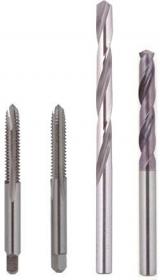Ductile, corrosion resistant, conductive, and abundant. Aluminum is a mainstay of today’s aviation, medical, electronics manufacturing, and many other industries. It’s light weight and high machinability can be both a positive and a negative for machining purposes. On one hand, the machinability makes high speed machining achievable with little harm to a drill or tap. In fact, in the case of working with aluminum, higher speeds usually produce better finishes and longer tool life.
On the other hand, aluminum’s high machinability creates chips that are stringy and gummy, requiring specialized tools to allow the chips to flow and prevent built-up edges, which can create excess heat. While this problem is more common in aluminum drilling and certain milling operations, tap flutes can also become clogged, detracting from thread quality and possibly causing catastrophic failure of the tool.
Chip removal is especially problematic when drilling deep holes in aluminum, drills forced into prolonged contact with the material, expose the cutting rakes to the metal where they generate heat. Aluminum has a low melting point, so it does not take much time for friction between the drill and the material to generate excess heat, especially when a low feed rate coupled with a high RPM is used, allowing the tool to rub instead of cutting the material. Using a higher feed rate reduces the rubbing and creates a long, thicker chip, typically allowing the heat to move with the chip away from the part and tool, allowing the heat to dissipate. When the long, stringy chip exits the hole, it has a tendency to coil around the tool shank. Or the chip will wedge into its flutes, and even “weld’ themselves to the tool’s cutting edges, and making it inefficient and generating even more heat. To combat these problems, science and engineering have created specialized tools, lubricants, and coatings to create ideal packages for drilling and tapping aluminum. These adaptations offer the best scenarios for forming manageable chips and then evacuating them from the workpiece to keep the hole clean and the drill or tap working at top efficiency.
In addition to tool geometry and coolant additives, proper aluminum tapping and drilling operations can mitigate the extreme heat and chip creation/disposal issues inherent in working with aluminum and its alloys:
Aluminum’s aforementioned abrasiveness calls for an investment in carbide drills and taps. The higher upfront cost will be recouped over the longer functional life. Carbide tools manufactured from a micro grain carbide will exhibit good wear resistance which will result in longer tool life and contribute to a smoother hole and thread finish.
As mentioned, chips getting trapped in flutes detract from aluminum tooling efficiency, so much effort has gone into designing flutes to facilitate chip movement. Open, parabolic flute design helps ensure proper chip removal out of the hole. These are especially effective in very soft materials like plastics and aluminums. Generally speaking, the more flutes the more quickly and easily chips can be evacuated. Three flutes present the happy medium between strength and chip handling when working with aluminum. Polished flutes with aggressive angles of 45 degrees or more will also aid in ejecting the longer chips formed in working with aluminum.

Coatings are generally not necessary in aluminum operations and can actually be detrimental if they contain aluminum. Recommended coatings include Chrome, CRN – Chromium Nitride. Titanium CarboNitride (TiCN), and Titanium Nitride TiN for use with taps and drills designed for aluminum. CrN is similar to TiN but has added high temperature resistance and more corrosion protection.
Regal Cutting Tools can advise you on the right tool for your specific aluminum drilling and tapping needs. Regal carries a full line of taps and drills for aluminum, as well as any other metal workpiece material. Regal also specializes in custom special taps. Whether you need machine screw, fractional or metric sizes, you will find it at Regal. If we don’t have it, then we’ll make it specially for you and your application. Contact our experts today or request a quote.